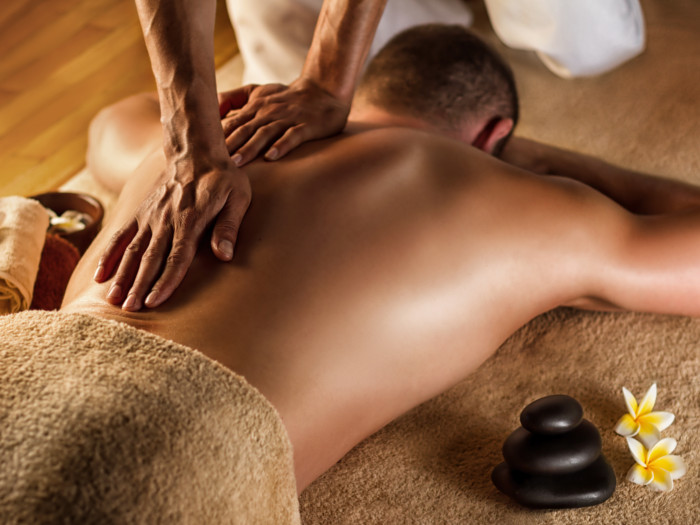Many of these impressive Thai massage benefits can improve your quality of life, touching on numerous aspects of your mental, physical and spiritual health.
What is Thai Massage?
This ancient massage practice, sometimes also called Thai Yoga Massage, combines traditional massage, acupuncture, yoga, and Ayurvedic practices. A medicinal tradition over 2,500 years old, the government of Thailand requires masseuses to be certified with a certain amount of hours and be registered with the Ministry of Health.
Massage in popular culture may evoke an image of a tourist laying on a table in a massage parlor, but Thai Massage is a much more dynamic practice. The masseuse uses their hands to guide the patient into a number of asanas, or yoga poses, in addition to bodywork and activation of pressure points. A regular session can take up to two hours, and every masseuse’s practice will be a bit different, depending on the region they come from. Subjects stay completely clothed, and no oil or substances are used. It is even possible to have a session of Thai massage that involves little to no touching, depending on the preferences of the subject. [1]

A deep tissue massage involves applying firm pressure to reach deeper layers of muscle. Photo Credit: Shutterstock
While practitioners do not need to be Buddhist, the practice is based on the principles of Buddhism. Mantras and meditations are often used, and beyond the medical reasons, Thai Massage is considered by many to be a spiritual practice. The goal of each session is to recognize and occupy four divine states of mind, known as Brahmavihara: Love, Compassion, Joy, and Equanimity. A great deal of attention is paid to balancing the four body elements, or Dosha, and using rhythmic compression, deep stretching, and skeletal manipulation to achieve energetic mindfulness, alignment of the Sen lines, and balancing chakras.
Beyond the specific benefits of this Thai style, massage has many proven general benefits when it comes to pain and stress management. The physical effects of regular yoga are also well-documented. Blending these two practices together is the intersection where Thai Massage lives, and why its practitioners are so devoted to it.
Thai Massage Benefits
Let us look at the most important benefits of Thai massage.
Pain Relief
Thai massage is often suggested as an alternative treatment for chronic pain and has been shown to provide temporary relief to sufferers. Patients with chronic pain reported an up to 80% reduction in pain after 15 weeks of a Thai massage regimen. Patients suffering from scapula costal syndrome (SCS) reported significant benefits after only three weeks. Sufferers of other kinds of musculoskeletal pain have also reported that regular Thai massage not only reduces [2]their pain but reduces their perception of tension and gives them more flexibility. When one area of the body is in chronic pain, this can often cause secondary pains in the body from tension and stiffness.
Stress Relief
While traditional massage techniques also produce relaxation and euphoric states, Thai massage has been shown [3]to reduce stress markers in the body more than a state of simply resting. It reduces cortisol in the body and slows down the heart rate. Thai massage is also very helpful for treating anxiety and is being studied as a therapeutic treatment for children with autism, who often suffer from extreme anxiety. According to a study published in the Asian Journal of Nursing Education and Research, conducted by Dr. Nalini Jayavanth Santha et al., regular massage therapy can induce the release of certain chemicals in the body that not only reduces pain but also improves mood. [4]
Reduces Chronic Headaches
Many people recommend Thai yoga for chronic headaches of all different types. The beneficial increase in circulation is often cited as the reason that Thai massage works on headaches. Increased circulation means that oxygen and nutrients are reaching the cells more efficiently. Thai massage also stimulates lymph circulation and relaxes the sympathetic nervous system, which activates our flight-or-fight reflexes. The reduction in cortisol may help as well since it relieves muscle tension the patient might be holding onto and relaxes parts of the body that are often tense without the person even knowing it. A specific type [5]of Thai massage, called Court Type, targets specific meridian lines in the body and is designed to treat headaches.
Flexibility & Range of Motion
Thai massage is essentially deep tissue massage combined with guided yoga, and while it may feel strange at first to have the masseuse guiding you through poses, it is an excellent way to reap the benefits of regular yoga practice. Thai massage relieves muscle fatigue and stiffness but also encourages production of the body’s joint lubricants. Increased flexibility brings a lot of benefits with it, but the most noticeable is often increased energy since regular motions will be easier to do. Increased flexibility will also help shift your body back into a correct, healthier posture, allowing for a gradual realignment of the skeleton. [6]
Side Effects of Thai Massage
Thai massage should be done by a licensed Thai masseuse with the years of experience necessary to perform the massage safely. Since Thai massage is a dynamic massage, and involves deep stretching and deep tissue work, a professional should be used to mitigate any risk to the patient. Patients with chronic issues or injuries should always make these conditions clear to the masseuse before beginning the massage. After a massage, there may be some redness, irritation, muscle soreness, or sleepiness. This is caused by the toxins being manipulated and subsequently flushed from the body.
